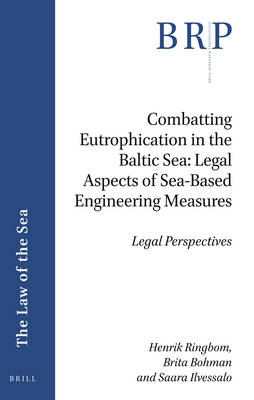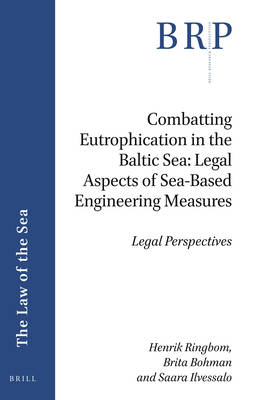
- Afhalen na 1 uur in een winkel met voorraad
- Gratis thuislevering in België vanaf € 30
- Ruim aanbod met 7 miljoen producten
- Afhalen na 1 uur in een winkel met voorraad
- Gratis thuislevering in België vanaf € 30
- Ruim aanbod met 7 miljoen producten
Zoeken
Combatting Eutrophication in the Baltic Sea: Legal Aspects of Sea-Based Engineering Measures
Legal Perspectives
Henrik Ringbom, Brita Bohman, Saara Ilvessalo
€ 143,45
+ 286 punten
Omschrijving
New technologies are being introduced to address the eutrophication of the Baltic Sea. By removing or chemically treating the seabed sediments, or by mechanically increasing oxygen levels in the deep sea, it is hoped that leakage of phosphorus from the seabed can be reduced. The effectiveness of such technologies is uncertain and they are scientifically controversial.
Combatting Eutrophication in the Baltic Sea: Legal Aspects of Sea-Based Engineering Measures explores a number of legal issues under international, European and national law raised by such 'sea-based measures' aimed at improving the environment of the Baltic Sea. In the absence of a legal framework for the measures, the work also represents a case study in how international environmental law operates when general environmental law principles represent the main legal source available. It is concluded that in view of the scientific uncertainty surrounding the technologies, such principles do not offer sufficient guidance to national permit authorities who will ultimately decide on the matter.
Combatting Eutrophication in the Baltic Sea: Legal Aspects of Sea-Based Engineering Measures explores a number of legal issues under international, European and national law raised by such 'sea-based measures' aimed at improving the environment of the Baltic Sea. In the absence of a legal framework for the measures, the work also represents a case study in how international environmental law operates when general environmental law principles represent the main legal source available. It is concluded that in view of the scientific uncertainty surrounding the technologies, such principles do not offer sufficient guidance to national permit authorities who will ultimately decide on the matter.
Specificaties
Betrokkenen
- Auteur(s):
- Uitgeverij:
Inhoud
- Aantal bladzijden:
- 104
- Taal:
- Engels
- Reeks:
Eigenschappen
- Productcode (EAN):
- 9789004399563
- Verschijningsdatum:
- 26/09/2019
- Uitvoering:
- Paperback
- Formaat:
- Trade paperback (VS)
- Afmetingen:
- 152 mm x 234 mm
- Gewicht:
- 181 g

Alleen bij Standaard Boekhandel
+ 286 punten op je klantenkaart van Standaard Boekhandel
Beoordelingen
We publiceren alleen reviews die voldoen aan de voorwaarden voor reviews. Bekijk onze voorwaarden voor reviews.











